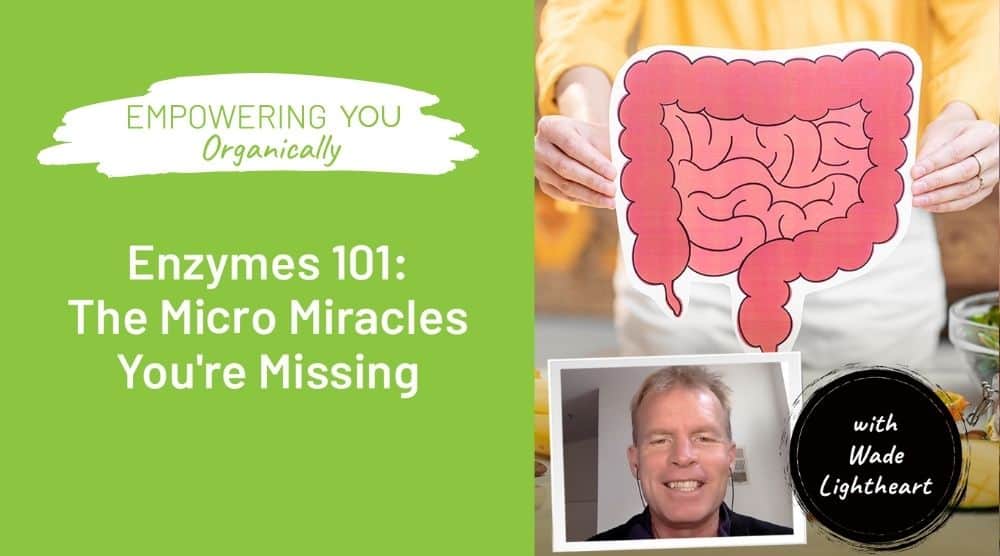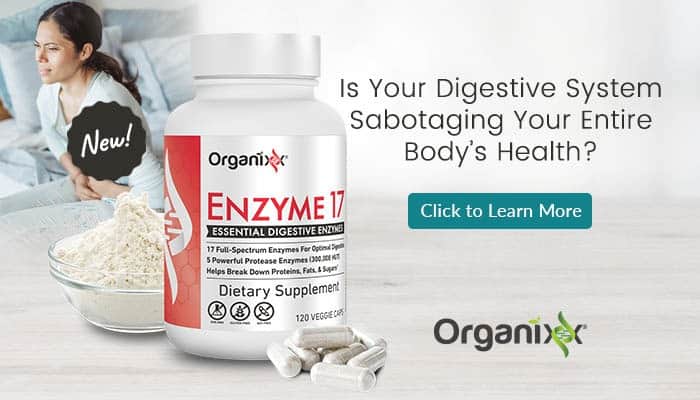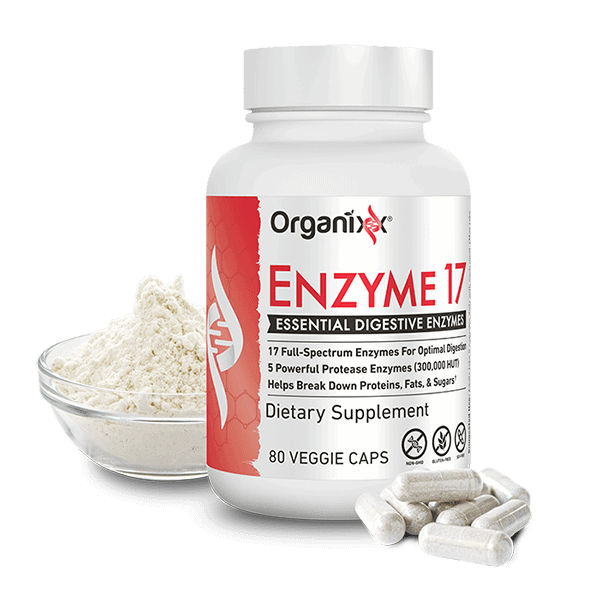Empowering You Organically – Season 13 – Episode 119
Title: Enzymes 101: The Mirco Miracles You’re Missing
Hosts: Jonathan Hunsaker
Guest: Wade Lightheart
Description: Join Jonathan and Wade Lightheart today as he helps us understand enzymes. What they do, why they’re considered micro miracles, and how your health depends on them. Plus, Wade helps us understand what we want to look for in a supplement. You don’t want to miss this one!
FEATURED PRODUCT
- Contains a proprietary blend of 17 of the best digestive enzymes that help your system extract more nutrients from the foods you’re eating
- Exclusive tri-phase protease (proteolytic enzyme formula) works at every stomach pH level so all the protein you eat is broken down into usable building blocks
- Uses cultured enzymes which can be 100 to 1000 times more powerful than food enzymes
- Designed to enhance digestion for ALL types of foods and diets from plant-based to carnivore. Helps repair damaged intestinal walls and increases absorption of certain vitamins and minerals
- Improves digestive balance and reduces acid reflux, constipation, gas, and bloating
- Boosts energy by increasing metabolism of carbs, fat, and protein for fuel
- Vegan digestive enzymes that contain no dairy, soy, GMOs, chemical fillers, or binders
* * *
About Wade Lightheart
3-Time Canadian All Natural Bodybuilding Champion who competed as vegetarian,
former Mr. Universe Competitor, host of The Awesome Health podcast, Wade Lightheart
is one of the world’s premier authorities on Natural Nutrition and Training Methods.
Having majored in Sports Science at the University of New Brunswick, he has authored
numerous books on health, nutrition and exercise which have sold in over 80 countries.
Wade also serves as an advisor to the American Anti-Cancer Institute.
He’s been in the health industry for over 25 years, coached thousands of clients, and
is sought out by athletes and high-performance oriented individuals worldwide for his
advice on how to optimize their health and fitness levels.
What Are Enzymes?
ENZYME – noun
BIOCHEMISTRY
- a substance produced by a living organism which acts as a catalyst to bring about a specific biochemical reaction.
- There are approximately 25,000 different enzymatic functions in the body
- The number of enzymes that you have present in your body is directly proportion to the amount of chemical reactions that you can engage in in the body.
- The difference between stones, plants, and people is enzymes, the amount and the role of those enzymes.
- They are the most critical component to all metabolic transactions.
Enzyme Bank
It’s like having a bank account. In other words, your ability to write metabolic checks, to build, to repair, to heal, to digest your food, to make your hormones work, to break down the smallest chemical reactions, to make your skin nice, you name it, requires an enzymatic pathway.
Our Current Food Supply is Lacking
In today’s world, we’ve radically compromised the amount of enzymes that we’re getting from our food, the quality of those enzymes, and we’ve added a host of agents that actually interrupt our body’s natural enzymatic mechanisms and that is having consequences across the globe that are extremely dire.
Pottenger & His Cats
Francis Pottenger, Jr, MD, has given the cat world one of the best books available in the study of carnivore’s nutrition.
- From 1932 to 1942, Dr. Francis Marion Pottenger Jr. conducted a group of experiments to determine the effects of heat-processed food on cats.
- Cats fed an all-raw diet were healthy while cats fed the cooked meat diet developed various health problems. At the time of Pottenger’s studies the heat labile amino acid taurine had not yet been identified as essential for cats.
- This work shows that the deficiencies Pottenger identified in cats correspond with those of a taurine deficiency and are the direct result of the lack of taurine in the feline diet.
- The physiological effects of a cooked diet described by Pottenger in his papers were compared with data from recent studies on taurine deficiency in the feline diet. Results. Pottenger’s main observations of near and far sightedness, cardiac lesions, increased stillbirth, low birthweight, poor kitten survival, and developmental abnormalities each correspond to published descriptions of taurine deficiency in cats with multiple references for each described condition.
- Taurine deficiency is a strong explanation for the symptoms observed by Pottenger in his cat studies. Pottenger’s own conclusion that there was an ‘as yet unidentified, heat-labile protein factor’ is realized in taurine.
4 Major Types of Enzymes
There are four major categories of enzymes and then there are derivatives of each,
- Proteases which break down protein,
- lipase which breaks down fats,
- amylase which breaks down carbohydrates,
- and cellulase which breaks down fiber in plants.
What happens if I don’t have the protease in my body to break down the all the protein that I’m ingesting?
- Gas
- Bloating
- Skin problems
- Brain fog
The reason? Because you’re feeding bad bacteria who are producing a variety of endotoxins inside the body that are interrupting your natural activity.
Disturbing Statistics from Wade’s Research
In America today, 12% of the emergency hospital visits are related to gastrointestinal related illnesses. People going to the hospital in an ambulance because they’re not breaking down their food.
A third of the population is suffering from digestive illness on any given day. And about 25% of the population is on prescription meds for this.
And the correlation between digestive disease and depression and challenges for brain function, because most of your neurotransmitters are built off amino acids that got to be broken down and transported from the gut to your brain is directly correlated with the lack of enzymes.
What to look for in an enzyme supplement?
- Make sure it’s at least half full of proteolytic enzymes and you want at least three proteases. The 3.0 the 4.5 and the 6.0 which relate to the spectrum within the pH band.
- You want to make sure it has up in that that range of like 70-80,000 HUT (One FCC HUT unit of proteolytic (protease) activity is defined as that amount of enzyme that produces, in one minute under the specified conditions, a hydrolysate whose absorbance at 275nm is the same as that of a solution containing 1.10 g per mL of tyrosine in 0.006N hydrochloric acid.
- Contains cultured enzymes.
- Broad spectrum.
- Contains AstraZymeÒ
* * *
Subscribe to Empowering You Organically
Never miss an episode!
APPLE PODCASTS SPOTIFY GOOGLE PODCASTS





